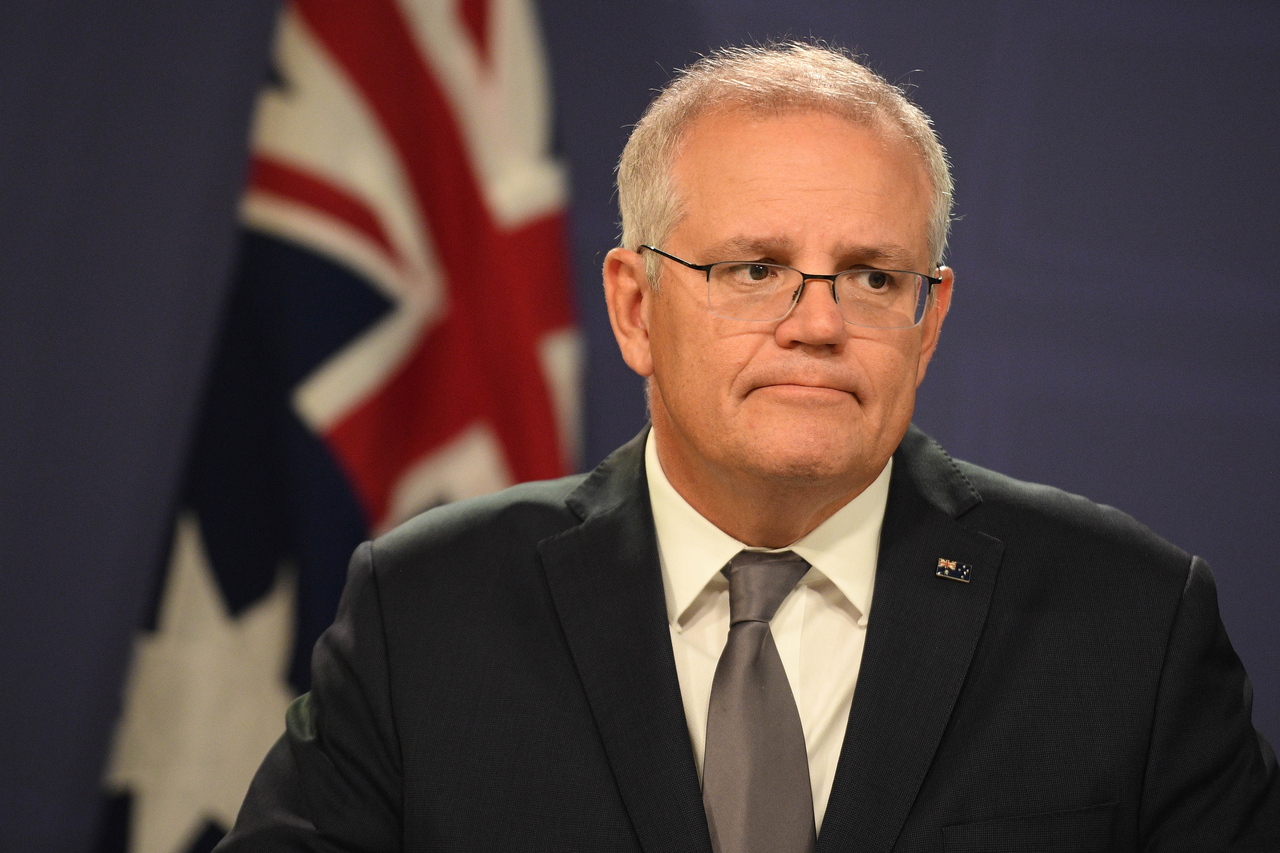Thousands of Australian women protest as rape scandals hit Morrison
Sign up now: Get ST's newsletters delivered to your inbox

Australian Prime Minister Scott Morrison's net approval rating fell 4 points to +28 per cent.
PHOTO: EPA-EFE
Follow topic:
SYDNEY (BLOOMBERG) - Thousands of women attending at least 40 rallies across Australia protested against gender violence on Monday (March 15), as a poll showed allegations of sexual assault that have roiled Parliament are damaging the popularity of Prime Minister Scott Morrison's government.
The March 4 Justice rallies were triggered by two sexual assault claims - one against Attorney-General Christian Porter, alleging that in 1988 he'd raped a teenage girl; the other made by former government media adviser Brittany Higgins, who said she was assaulted in 2019 by a fellow staffer in a minister's office.
At a rally outside Parliament House in Canberra, following jeers for Mr Morrison, after lawmakers from his government refused to attend the protests, the biggest cheer came for Ms Higgins, who addressed the vocal crowd.
"We fundamentally recognise the system is broken, the glass ceiling is still in place, and there are significant failings in the power structures within our institutions" Ms Higgins said.
After telling the crowd the government ignored her claims, she said "if they aren't committed to addressing these issues in their own offices, what confidence can the women of Australia have that they will be proactive in addressing this issue in the broader community?"
There are signs the scandals are creating political backlash against Mr Morrison's conservative government, even as the majority of voters have applauded his handling of the pandemic and the stimulus measures that have limited the economic fallout.
Mr Morrison's incumbent Liberal-National coalition fell in the Newspoll published in the Australian newspaper on Monday, giving the Labor opposition a 52 per cent-48 per cent lead.
Mr Morrison's net approval rating declined 4 points, although he remains well ahead of opposition leader Anthony Albanese as preferred prime minister.
Mr Morrison is backing his Attorney-General Christian Porter to remain as Australia's first law officer after police earlier this month said they couldn't proceed with an investigation into the historical rape allegation, due to a lack of admissible evidence.
Mr Porter, who denies the claims, on Monday launched a defamation case against the Australian Broadcasting Corp over the allegations.
The prime minister has resisted calls to hold an inquiry into the matter, magnifying scrutiny about his handling of women's issues.
Mr Morrison last month said he only realised the gravity of Ms Higgins' allegations after discussing the issue with his wife, who asked him to consider the issue as a father of two girls.
Ms Orla Tomlinson, 23, an insurance marketing assistant who attended the Sydney rally, said the sexual assault allegations had contributed to a feeling in the community that there was new momentum for change and will force lawmakers to respond.
"Everyone is really fired up - people are really angry," Ms Tomlinson said in an emailed response to questions.
Sexual assault and gender discrimination needed "to be taken seriously as a human rights issue - not whether the government in power wants it to be part of their polices or not," she said.
In Parliament later on Monday, Mr Morrison declined to answer a question on why he didn't attend the Canberra protest, adding he respected the right of organisers not to accept his invitation for a private meeting.
He said the protests were a way to voice "very genuine and real frustrations."
Mr Andrew Hughes, an expert in political branding at the Australian National University in Canberra, said Mr Morrison needed to be careful not to conclude that his handling of the pandemic will automatically give him enough voter support to win the next election, which needs to be held by May 2022.
"Potentially putting such a massive segment of the population offside when the polls are so tight isn't a good idea," Mr Hughes said. "These allegations are taking up so much oxygen for the government that it's hard for any other news or policies to cut through."
Female lawmakers have complained for years about a male-dominated and disempowering culture in the national capital, Canberra.
Despite priding itself on being among the first countries to give women the right to vote and stand as candidates, Australia has plummeted to 50th in global rankings for representation of women in Parliament, from 15th in 1999.
Sixteen of Mr Morrison's 22-member Cabinet are men.
The mistreatment of women in Parliament made global headlines in 2012 when Australia's first female prime minister Julia Gillard accused then opposition leader Tony Abbott of misogyny.
More recently, former foreign minister Julie Bishop has blasted behaviour by lawmakers that wouldn't be "tolerated in any other workplaces across Australia."
Another lawmaker, Ms Julia Banks, said bullying had driven her to quit Parliament, while a former senator was ordered to pay Senator Sarah Hanson-Young A$120,000 (S$125,084) in damages for a series of statements that she said had amounted to sexual discrimination.
Attorney-General Porter has been on leave to address mental-health issues after denying the claims in a press conference on March 3.
Mr Porter has started proceedings in the Federal Court of Australia against the national broadcaster and ABC journalist Louise Milligan for defamation, his legal representative said in a statement Monday.
"Over the last few weeks, the Attorney-General has been subjected to trial by media without regard to the presumption of innocence or the rules of evidence and without any proper disclosure of the material said to support the untrue allegations," the statement said.
While he was not named in the report, the article made allegations about a senior Cabinet minister and he was easily identifiable, it said.

